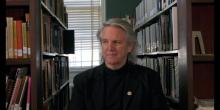
Larry Kent
Albemarle High SchoolBiography
In this engaging interview, Larry Kent, born on August 29, 1952, in Crozet, reflects on his formative years during the desegregation of Albemarle High School. This conversation provides a vivid account of Kent's experiences growing up in a close-knit, small-town community and his involvement in high school athletics and student government.
Kent describes his childhood neighborhood in Crozet as reminiscent of the idyllic "Leave it to Beaver" era, where children played freely under the watchful eyes of their neighbors' mothers. His narrative paints a picture of a supportive community, filled with neighborhood games, Little League baseball, and Sunday church services at Crozet's local fields and the Greenwood Community Center.
As a high school student, Kent was deeply immersed in sports, playing football under the guidance of Coach A.P. Moore, a significant figure who transitioned from Burley High School following its closure. Larry fondly recalls the camaraderie and the formidable prowess of his teammates, particularly the linemen who excelled under Moore's coaching. He also became involved in numerous mixed-race bands, forging close friendships with other musicians.
Kent's reflections also touch on the broader social context of the time, including the impactful events of the Civil Rights Movement and the assassinations of Dr. Martin Luther King Jr. and President John F. Kennedy. He recounts the shared grief and solidarity among his peers, especially his black teammates, during these tumultuous periods.
After high school, Larry attended Hampden-Sydney College (one year), and subsequently went to Virginia Commonwealth University as a music major. He received a Master’s Degree at the University of Miami and a doctorate in music from the University of South Carolina. He has taught music both in colleges and privately and became affiliated with The Front Porch in Charlottesville.
This interview offers a personal glimpse into Larry Kent's life and serves as a testament to the enduring impact of community, sports, music, and historical events on shaping individual and collective identities.
Full Interview
Clips
“I don’t remember any issues over race. I’m sure it would be different if I was black.”
Larry Kent
Larry Kent
Larry Kent
“And the black kids sat with other black kids.”